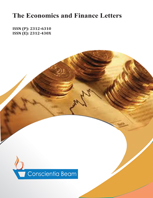The research on the impact of short-term cross-border capital flows on stock market prices in China
DOI:
https://doi.org/10.18488/29.v11i4.3932Abstract
This paper examines the long-term dynamic impact of short-term cross-border capital flows on the Shanghai Composite Index and the CSI 300 Index using monthly data from 2010 to 2020 and a Vector Autoregression (VAR) model. With the financial opening and the internationalization of the renminbi in China, the stock market has gradually liberalized its management of foreign capital. As a result, the A-share market has become a target for passive capital inflows from overseas investors. This has further intensified the volatility of asset prices and posed challenges to China's cross-border capital regulation. According to the study, short-term cross-border capital flows have a negligible impact. However, a positive correlation appears between 4 to 9 months, followed by a significant negative impact in the 10th month, reflecting the oscillatory risks that cross-border capital flows pose to China's stock prices. This finding reflects how Chinese capital controls have limited the short-term negative impact of cross-border capital flight on stock prices. The paper recommends strengthening the regulation of short-term cross-border capital, cautiously advancing the financial opening system, and actively improving the stock market system.

